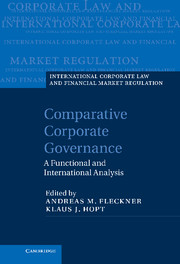Book contents
- Frontmatter
- Contents
- Contributors
- Preface
- Abbreviations
- Part I General report
- Part II National reports
- A Australia and Asia
- B Europe
- 6 Austria
- 7 Belgium
- 8 Denmark
- 9 Finland
- 10 France
- 11 Georgia
- 12 Germany
- 13 Hungary
- 14 Luxembourg
- 15 Netherlands
- 16 Norway
- 17 Poland
- 18 Portugal
- 19 Spain
- 20 Switzerland
- 21 United Kingdom
- C The Americas
- Part III Annex: Questionnaire
- Index
- References
13 - Hungary
Corporate governance of listed companies
from B - Europe
Published online by Cambridge University Press: 05 July 2013
- Frontmatter
- Contents
- Contributors
- Preface
- Abbreviations
- Part I General report
- Part II National reports
- A Australia and Asia
- B Europe
- 6 Austria
- 7 Belgium
- 8 Denmark
- 9 Finland
- 10 France
- 11 Georgia
- 12 Germany
- 13 Hungary
- 14 Luxembourg
- 15 Netherlands
- 16 Norway
- 17 Poland
- 18 Portugal
- 19 Spain
- 20 Switzerland
- 21 United Kingdom
- C The Americas
- Part III Annex: Questionnaire
- Index
- References
Summary
General information on Hungarian corporate governance
A Concept of corporate governance
Definition of corporate governance
There is no legal definition of corporate governance (felelős vállalatirányítás). Nevertheless, there are some non-binding corporate governance definitions from which its meaning and content can be determined. First, the Official Reasoning to Act IV of 2006 on Business Associations (“Companies Act”) states that corporate governance for publicly held stock corporations (nyilvánosan működő részvénytársaság) includes two ideas: on the one hand, it refers to the relationship between the officers, the board (one-tier or two-tier), the shareholders, and other corporate constituencies. On the other hand, corporate governance deals with the structure of publicly held stock corporations in which the corporations' goals are laid down, as well as the means facilitating the attainment of these goals and the way the corporations' performance is controlled.
Second, according to the Corporate Governance Recommendations of the Budapest Stock Exchange, corporate governance consists of no less than seven principles: (i) careful management of the company (drafting and implementation of strategy); (ii) financial planning and its execution; (iii) the controlling of the company's internal processes; (iv) issues of business ethics; (v) the transparent operation of the company; (vi) principles and procedures regarding disclosure; and (vii) corporate social responsibilities.
- Type
- Chapter
- Information
- Comparative Corporate GovernanceA Functional and International Analysis, pp. 572 - 603Publisher: Cambridge University PressPrint publication year: 2013

